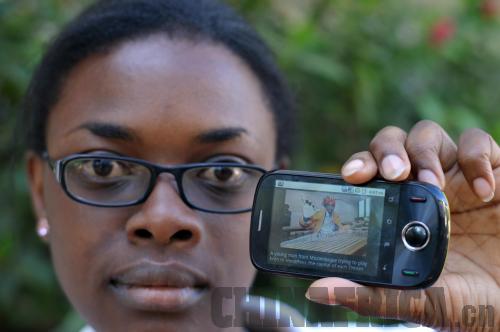|
 |
|
China introduces advanced telecom technology and high-quality services to boost the African market (XINHUA) |
About five years ago, Getachew Molla was the only member of his family who owned a mobile phone. That has changed. The rapid growth of Africa's mobile telecommunications market has left its mark on his family; his two children and their grandfather now also have mobile phones. "I believe it's all because of China's [investment in Africa's telecom industry]," said the technician, who works for Ethiopia National Telecommunications Corp. (ETC).
In recent years, the telecom industry in Africa has seen a big increase in mobile subscribers. Africa is the world's second-biggest mobile market region by subscription count, second only to the Asia-Pacific region, according to London-based research group Informa Telecoms & Media. The number of mobile subscriptions in Africa reached 761 million last year, making the continent the fastest growing mobile phone market in the world, according to the research group. The number of subscriptions on the continent is expected to hit 1 billion by 2015.
"All the changes could not have happened without China's telecom enterprises," said Dr. Hamadoun Touré, Secretary General of the United Nations International Telecommunication Union (ITU). China's contributions to telecommunications advancement generally consist of supplying telecom equipment to Africa and expanding networks there.
ZTE, China's second-largest telecom equipment maker, helped construct ETC's national telecom network in 2006 when Ethiopia had fewer than 700,000 mobile users, which was less than 1 percent of the country's population. But by the end of 2010, the country had 12 million mobile customers, over 17 times as many as in 2006. ZTE has now built nearly 3,500 base stations for Ethiopia's GSM network, covering 64 percent of the country.
Success factors
Ethiopia is not the only country undergoing rapid transformation on account of explosive growth in the telecom sector. According to figures from ITU, investment in Africa's telecom sector surpassed $70 billion in 2012, indicating that Africa's telecommunications industry is growing at an unprecedented rate. Chinese enterprises have given a huge boost to this fast growing industry all over the continent.
Chinese companies broke the monopoly of Western telecom giants in Africa. This has helped bring down prices and contributed to the success of mobile phones on the continent, said Daouda Cisse, a researcher at the China Research Center of Stellenbosch University in South Africa.
The two major Chinese telecoms giants are equipment manufacturers Huawei and ZTE. Both are key partners and suppliers in South Africa to MTN, Vodacom, and Cell C, the top three cellular network operators in that nation. Huawei established itself as the second largest supplier to Vodacom and MTN after Ericsson, while ZTE provides nearly 80 percent of Cell-C's equipment, almost replacing Nokia Siemens Networks, the company's original supplier.
Due to their competitive prices and high quality telecom products, Chinese enterprises enjoy great popularity in Africa's telecom sector. For example, the Orange San Francisco, a budget Android smartphone launched by ZTE in Africa, uses the same parts as a South Korean cell phone, but costs only half the price. Huawei's popular $100 Ideos smartphone has been a hit in Kenya, quickly becoming a best seller since its launch in 2012.
|